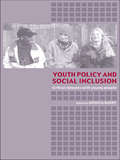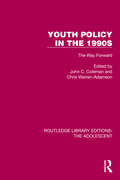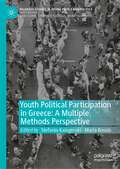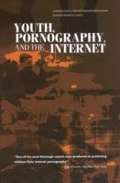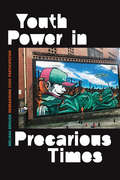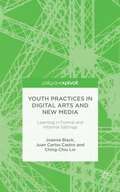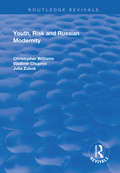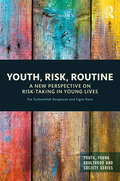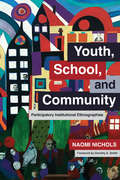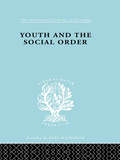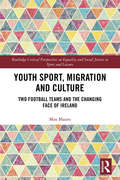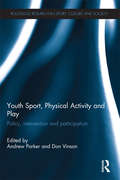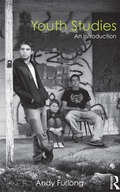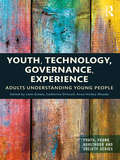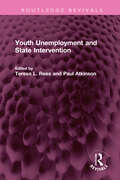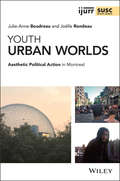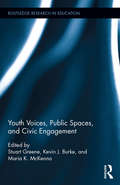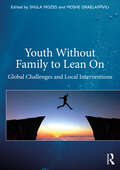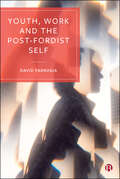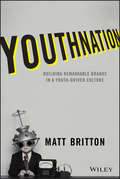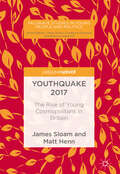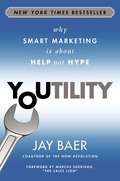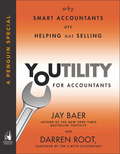- Table View
- List View
Youth Policy and Social Inclusion: Critical Debates with Young People
by Monica BarryTaking a holistic and multidisciplinary approach this book identifies and analyzes the factors which promote or discourage social inclusion of young people in today’s society. It critically examines the discriminatory attitudes towards young people, and focuses on the 'problem' of adults rather than the 'problem' of young people themselves. The authors ask searching questions about society's capacity and willingness to be more socially inclusive of young people in terms of policy and practice, and explore the extent to which young people have access to status, rights and responsibilities as young adults. Challenging existing theory the book covers issues including: citizenship, education, rights, youth transactions, drug use, homelessness, teenage pregnancy and unemployment. Incorporating the views and experiences of young people themselves, the book highlights the strengths and weaknesses of the academic contribution and suggests ways forward for a more inclusive society.
Youth Policy in the 1990s: The Way Forward (Routledge Library Editions: The Adolescent)
by Chris Warren-Adamson John C. ColemanDespite its importance, youth policy is an often-ignored area of Government planning and legislation, and policy initiatives seem to lack any guiding theme or relevance to the needs of young people. In Youth Policy in the 1990s originally published in 1992, the editors brought together prominent experts in the key areas of youth policy at the time. They provide a critical review of the major issues which implicitly or explicitly affect the world of adolescents and examine to what extent they paint a picture of existing youth policy. The aim was to provide a baseline for a policy on youth in the 1990s. The book recommends the introduction of a Minister for Young People and the use of youth impact statements at national and local level and seeks to provide information and argument for those seeking to plan policy for young people from a corporate or inter-agency perspective. The contributors are all recognized experts in their fields. They tackle their topic first by examining the historical perspective, with a special concentration on the previous decade. Each has paid regard to particular themes – ethnicity, class and gender, and where possible, has brought in material from other countries and cultures. They have then put forward suggestions for future policy.
Youth Political Participation in Greece: A Multiple Methods Perspective (Palgrave Studies in Young People and Politics)
by Stefania Kalogeraki Maria KousisThe overarching aim of this edited volume is to investigate different modes, patterns and determinants of youth political participation in Greece, since the economic crisis, by incorporating a variety of quantitative and qualitative methods. The chapters examine different forms of youth political participation, from institutionalized (such as voting, or membership in political parties) to non-institutionalized (such as signing petitions, protesting through demonstrations or occupations, and political consumerism). Moreover, the chapters shed light on diverse aspects of youth political participation, such as the interlinkages between occupational precarity and political behaviour, the spatial portrait of youth political engagement in rural, suburban and urban Greek contexts, the engendered aspects of political involvement, the pivotal role of protest events in youth political socialization and in mobilization in contentious political actions, the different impacts of priming inequality on youth’s political beliefs, depending on different modes of thinking, as well as the key features of youth-related and youth-led (non-state) organisations operating in Greece. The aforementioned aspects are examined at the micro, meso or/and macro level through distinct methodological approaches including panel survey, experimental survey, biographical interviews, in-depth interviews and action organization analysis, carried out in the context of the EURYKA (European Commission) project.
Youth, Pornography, And The Internet
by Committee to Study Tools Strategies for Protecting Kids from Pornography Their Applicability to Other Inappropriate Internet ContentThe Internet has changed the way we access the world. This is especially true for kids, who soak up new technologies like eager little sponges. They have access to an enormous array of material, including educational links, sports info, chat rooms—and, unfortunately, pornography. But we must approach our need to protect children with care to avoid placing unnecessary restrictions on the many positive features of the Internet. Youth, Pornography, and the Internet examines approaches to protecting children and teens from Internet pornography, threats from sexual predators operating on-line, and other inappropriate material on the Internet. The National Research Council’s Computer Science and Telecommunications Board explores a number of fundamental questions: Who defines what is inappropriate material? Do we control Internet access by a 17-year-old in the same manner as for a 7-year-old? What is the role of technology and policy in solving such a problem in the context of family, community, and society? The book discusses social and educational strategies, technological tools, and policy options for how to teach children to make safe and appropriate decisions about what they see and experience on the Internet. It includes lessons learned from case studies of community efforts to intervene in kids’ exposure to Internet porn. Providing a foundation for informed debate, this very timely and relevant book will be a must-read for a variety of audiences.
Youth Power in Precarious Times: Reimagining Civic Participation
by Melissa BroughDoes youth participation hold the potential to change entrenched systems of power and to reshape civic life? In Youth Power in Precarious Times Melissa Brough examines how the city of Medellín, Colombia, offers a model of civic transformation forged in the wake of violence and repression. She responds to a pressing contradiction in the world at large, where youth political participation has become a means of commodifying digital culture amid the ongoing disenfranchisement of youth globally. Brough focuses on how young people's civic participation online and in the streets in Medellín was central to the city's transformation from having the world's highest homicide rates in the early 1990s to being known for its urban renaissance by the 2010s. Seeking to distinguish commercialized digital interactions from genuine political participation, Brough uses Medellín's experiences with youth participation—ranging from digital citizenship initiatives to the voices of community media to the beats of hip-hop culture—to show how young people can be at the forefront of fostering ecologies of artistic and grassroots engagement in order to reshape civic life.
Youth Practices in Digital Arts and New Media: Learning in Formal and Informal Settings
by Joanna Black Juan Carlos Castro Ching-Chiu LinThe authors examine youths' practices in digital culture affecting social change, pedagogy, and creative learning practices. Knowledge about these practices is discussed, in which learning, knowledge sharing, distinct social contexts, pedagogical relationships, and artistic creative inquiry are examined in diverse formal and informal environments.
Youth, Risk and Russian Modernity
by Christopher Williams Vladimir ChuprovTitle first published in 2003. This timely and original book is the most comprehensive and authoritative analysis of Russia's risk society to date. Referring to the works of Douglas, Beck and Giddens, it considers a variety of theories of risk and applies them to young people in different risk societies, showing how these youngsters have adapted to cope with risk.
Youth, Risk, Routine: A New Perspective on Risk-Taking in Young Lives (Youth, Young Adulthood and Society)
by Tea Torbenfeldt Bengtsson Signe RavnYoung people’s lives continue to be the topic of public scrutiny and recurring ‘moral panics’. Smoking cannabis, speeding, and engaging in street-level fights are depicted as activities based on ‘poor choices’ or simple hedonism, putting young people’s futures at risk. Based on comprehensive, qualitative research with young people in Denmark, this book illustrates how such individualised accounts miss out on the inherently social character of risk-taking activities. Youth, Risk, Routine introduces a new approach to risk-taking activities as being an integral and routinised part of young people’s everyday life. By applying social theories of practice, this insightful volume presents a framework for understanding the routinised dimensions of young people’s engagement in risk-taking and how this is embedded in, intertwined with, and held in place by other everyday practices. Indeed, through extensive empirical analyses of the rich material at hand, the authors explore how routinisation, coordination, embodiment, and social context are central aspects for understanding how, why, and when young people engage in risk-taking practices. Youth, Risk, Routine will be of interest to students and scholars in sociology, criminology, and social work as well as wider social science audiences, particularly those interested in exploring the empirical potential of social theories of practice.
Youth, School, and Community: Participatory Institutional Ethnographies (G - Reference, Information And Interdisciplinary Subjects Ser.)
by Naomi NicholsUnlike other books about youth, this book examines how young people’s experiences of inclusion and exclusion are shaped by extended social relations, coordinating thought and conduct across time and space. Working with young people, using a range of participatory institutional ethnographic strategies, this book investigates the social and institutional relations which differentially punctuate our lives. While research began with what young people know and have experienced, this starting place anchors an investigation of public sector institutions and institutional processes that remain implicated in social-historical-economic processes of global capitalism, imperialism, and colonialism. Youth, School, and Community connects the dots between the abstract objectified accounts produced by institutions and enabling institutional action and accounting practices, and the actual material conditions of young people’s lives and development, which these accounts obscure. By focusing on specific policies and procedures that produce young people’s experiences of racialized inclusion/exclusion, safety/risk make it particularly useful to academics, professionals, and activists who want to ensure that young people experience equitable access to public sector resources and not disproportionate exposure to public sector punishments and punitive interventions.
Youth & Social Order Ils 149 (International Library of Sociology)
by Frank MusgroveFirst published in 1998. Routledge is an imprint of Taylor & Francis, an informa company.
Youth Sport, Migration and Culture: Two Football Teams and the Changing Face of Ireland (Routledge Critical Perspectives on Equality and Social Justice in Sport and Leisure)
by Max MauroHow do migrant youth negotiate their role in society through sport and leisure practices? How can political theory and qualitative critical research work together to make sense of these processes? These are among the questions that led to a long-term investigation of young males’ sport practices in Ireland, possibly the most fertile contemporary setting for the analysis of questions of sport and identity. Youth Sport, Migration and Culture emphasises the epistemological and ethical urgency of doing research with rather than on young people. Engaging with the social changes in Irish society through the eyes of children of immigrants growing up in Ireland, the book looks closely at young people’s leisure practices in multi-ethnic contexts, and at issues of inclusion in relation to public discourses around ‘national identity’ and immigration. Offering compelling analysis of how ideas of race and racism are elaborated through sport, this book is fascinating reading for anybody with an interest in the sociology of sport, sport development or youth culture.
Youth Sport, Physical Activity and Play: Policy, Intervention and Participation (Routledge Research in Sport, Culture and Society)
by Andrew Parker Don VinsonSport, physical activity and play are key constituents of social life, impacting such diverse fields as healthcare, education and criminal justice. Over the past decade, governments around the world have begun to place physical activity at the heart of social policy, providing increased opportunities for participation for young people. This groundbreaking text explores the various ways in which young people experience sport, physical activity and play as part of their everyday lives, and the interventions and outcomes that shape and define those experiences. The book covers a range of different sporting and physical activities across an array of social contexts, providing insight into the way in which sport, physical activity and play are interpreted by young people and how these interpretations relate to broader policy objectives set by governments, sporting organisations and other NGOs. In the process, it attempts to answer a series of key questions including: How has sport policy developed over the last decade? How do such policy developments reflect changes at the broader political level? How have young people experienced these changes in and through their sporting lives? By firmly locating sport, physical activity and play within the context of recent policy developments, and exploring the moral and ethical dimensions of sports participation, the book fills a significant gap in the sport studies literature. It is an important reference for students and scholars from a wide-range of sub-disciplines, including sports pedagogy, sports development, sport and leisure management, sports coaching, physical education, play and playwork, and health studies.
Youth Studies: An Introduction
by Andy FurlongYouth Studies: an introduction is a clear, jargon-free and accessible textbook which will be invaluable in helping to explain concepts, theories and trends within youth studies. The concise summaries of key texts and the ideas of important theorists make the book an invaluable resource. The book also raises questions for discussion, with international case studies and up-to-date examples. The book discusses important issues within youth studies, for example: education and opportunity employment and unemployment family, friends and living arrangements crime and justice identities health and sexuality citizenship and political engagement. Suitable for a wide range of youth-related courses, this textbook provides a theoretical and empirical introduction to youth studies. It will appeal to undergraduate students on international academic and vocational courses, including sociology, politics, criminology, social policy, geography and psychology.
Youth, Technology, Governance, Experience: Adults Understanding Young People (Youth, Young Adulthood and Society)
by Liam Grealy Catherine Driscoll Anna Hickey-MoodyHow do adults understand youth? How do their conceptions inform interventions into young lives or involve young people’s experiences? This volume tackles these questions by exploring adults’ ideas about youth. Specifically, Youth, Technology, Governance, Experience examines the four titular concepts and their implications for a range of relationships between youth and adults. Utilising interdisciplinary methods, the contributing authors deliver a broad range of analyses of young people differentiated by gender, class, race, and geography across an array of contexts, including within the home, in media representations, through government bureaucracies, and in everyday life. Youth, Technology, Governance, Experience also interrogates the meaning of technology and governance for youth studies, considering a range of ways they interact, including through social media, technologies of regulation, and educational tools. It will appeal to students and academic researchers interested in fields such as youth studies, cultural studies, sociology, and education.
Youth Unemployment and State Intervention (Routledge Revivals)
by Teresa L. Rees Paul AtkinsonIn the early 1980s, against the background of chronic unemployment in Britain, the particular plight of young people had come to be identified as a subject for special concern. Anxieties were expressed, as they were in the 1930s, as a twin concern for a waste of the nation’s resources and for the demoralization of youth, leading potentially to anti-social behaviour. Originally published in 1982, this volume of essays identifies a number of key issues in the pattern of state response to youth unemployment which had evolved in the inter-war and post-war periods. The contributors discuss a number of related themes, such as how the problem has been defined and created as a kind of ‘moral panic’, and how contemporary measures recapitulate the rhetoric and policies of pre-war interventions. They examine the relationship between youth unemployment measures and the education sector, the responses of the trade unions, and also consider how young people themselves respond to special programmes. A critical assessment is made of the further education elements in the special measures: in particular, the question is asked: do these young people need ‘social and life skills’ training? The book charts the changing nature of the state response to youth unemployment since 1974, and stresses throughout the inappropriate nature of ‘temporary’ amelioration of a long-term, even permanent, problem.
Youth Urban Worlds: Aesthetic Political Action in Montreal (IJURR Studies in Urban and Social Change Book Series)
by Julie-Anne Boudreau Joelle RondeauBoth theoretically informed and empirically rich, Youth Urban Worlds explores how urban cultures affect political action amongst youth. Argues that urban cultures challenge the very meaning and contours of the political process Includes ethnographies, delving into the perspectives and knowledges of racialized youth, urban farmers, and “voluntary risk takers,” like dumpster divers, building climbers, and student protestors Theorizes that aesthetics are an increasingly crucial form of political action in the contemporary urban setting and explains the impact of aesthetics on the political Examines the centrality of fun, warmth, aesthetics, and embodiment to these youth’s experience of being in the world Explains how youth are able to practically and concretely impact the political process through the performance of risky and disruptive behavior
Youth Voices, Public Spaces, and Civic Engagement (Routledge Research in Education #159)
by Stuart Greene Kevin J. Burke Maria K. McKennaThis collection of original research explores ways that educators can create participatory spaces that foster civic engagement, critical thinking, and authentic literacy practices for adolescent youth in urban contexts. Casting youth as vital social actors, contributors shed light on the ways in which urban youth develop a clearer sense of agency within the structural forces of racial segregation and economic development that would otherwise marginalize and silence their voices and begin to see familiar spaces with reimagined possibilities for socially just educational practices.
Youth Without Family to Lean On: Global Challenges and Local Interventions
by Shula Mozes Moshe IsraelashviliYouth Without Family to Lean On draws together interdisciplinary, global perspectives to provide a comprehensive review of the characteristics, dynamics, and development of youth (aged 15–25) who have no family to lean on, either practically or psychologically.In this timely volume, Mozes and Israelashvili bring together leading international experts to present updated knowledge, information on existing interventions, and unanswered questions in relation to youth without family to lean on, in pursuit of fostering these youth’s positive development. The various chapters in this book include discussions on different topics such as social support, developing a sense of belonging, parental involvement, and internalized vs. externalized problems; on populations, including homeless youth, residential care-leavers, refugees, asylum-seekers, young women coming from vulnerable families, and school dropouts; and interventions to promote these youths' mentoring relationships, labor market attainment, out-of-home living placements, use of IT communication, and participation in community-based programs. Additionally, various problems and challenges are presented and elaborated on, such as: Who needs support? Who is qualified to provide support? How should related interventions be developed? The book takes a preventive approach and aims to emphasize steps that can be taken in order to promote young people’s positive development in spite of the absence of a family to rely on in their life and examines the best practices in this context, as well as the international lessons that deserve further dissemination and exploration. This book is essential reading for those in psychology, sociology, public health, social work, law, criminology, public policy, economics, and education and is highly enriching for scholars and practitioners, as well as higher education students, who wish to understand and help the gradually increasing number of youth who are forced, too early, to manage their life alone.
Youth Work
by Naomi NicholsCombining institutional ethnography and community-based research, Youth Work is a sophisticated examination of the troubling experiences of young people living outside the care of parents or guardians, as well as of the difficulties of the frontline workers who take responsibility for assisting them. Drawing from more than a year of on-site research at an Ontario youth emergency shelter, Naomi Nichols exposes the complicated institutional practices that govern both the lives of young people living in shelters and the workers who try to help them.A troubling account of how a managerial focus on principles like "accountability" and "risk management" has failed to successfully coordinate and deliver services to vulnerable members of society, Youth Work shows how competitive funding processes, institutional mandates, and inter-organizational conflicts complicate the lives of the young people that they are supposed to help. Nichols's book is essential reading for those involved in education, social services, mental health, and the justice system, as well as anyone with an interest in social justice.
Youth, Work and the Post-Fordist Self
by David FarrugiaIn the past, youth has been seen as a transition into the labour market, but today young people’s identities are increasingly wrapped up in their value as workers. In this book, young people describe the meaning of work in their own words. Drawing on these narratives, the author reveals how their identities are intertwined with the dynamics of labour and value in post-Fordist capitalism and how social inequalities are manifested through the practices and ethics that young people draw upon to cultivate an economically productive self. Illuminating the rapidly changing social conditions that mould youth identities, this book represents a paradigm shift in our understanding of youth and work.
YouthNation: Building Remarkable Brands in a Youth-Driven Culture
by Matt BrittonYouth is no longer an age—it's a commodity YouthNation is an indispensable brand roadmap to the youth-driven economy. Exploring the idea that youth is no longer an age—it's a commodity that's available to everyone—this book shows what it takes to stay connected, agile, authentic, and relevant in today's marketplace. Readers will learn the ins and outs of the new consumer, and the tools, methods, and techniques that ensure brand survival in the age of perpetual youth. Coverage includes marketing in a post-demographic world, crafting the story of the brand, building engaged communities, creating experiences that inspire loyalty and evangelism, and the cutting-edge tricks that help businesses large and small harness the enormous power of youth. The old marketing models are over, and the status quo is dead. Businesses today have to embody the ideals of youth culture in order to succeed, by tapping the new and rapidly evolving resources n business and in life. When everything is changing at the pace of a teenager's attention span, how do businesses future-fit for long-term success? This book provides a plan, and the thoughts, strategies, and brass tacks advice for putting it into action. Use New-Gen psychographics to target markets Build stronger evangelism with a compelling brand narrative Create loyal communities with immersive and engaging experiences Navigate the radically-changed landscape of the future marketplace In today's hyper-socialized, Facebook fanatic, selfie-obsessed world, youth is the primary driver of business and culture. Smart companies are looking to tap into the fountain of youth, and the others are sinking fast. YouthNation is a roadmap to brand relevancy in the new economy, giving businesses turn-by-turn direction to their market destination.
Youthquake 2017: The Rise of Young Cosmopolitans in Britain (Palgrave Studies in Young People and Politics)
by James Sloam Matt HennThis book is open access under a CC BY 4.0 license.This book investigates the reasons behind the 2017 youthquake – which saw the highest rate of youth turnout in a quarter of a century, and an unprecedented gap in youth support for Labour over the Conservative Party – from both a comparative and a theoretical perspective. It compares youth turnout and party allegiance over time and traces changes in youth political participation in the UK since the onset of the 2008 global financial crisis – from austerity, to the 2016 EU referendum, to the rise of Corbyn – up until the June 2017 General Election. The book identifies the rise of cosmopolitan values and left-leaning attitudes amongst Young Millennials, particularly students and young women. The situation in the UK is also contrasted with developments in youth participation in other established democracies, including the youthquakes inspired by Obama in the US (2008) and Trudeau in Canada (2015).
Youtility: Why Smart Marketing Is about Help Not Hype
by Jay BaerThe difference between helping and selling is just two letters If you're wondering how to make your products seem more exciting online, you're asking the wrong question. <P><P>You're not competing for attention only against other similar products. You're competing against your customers' friends and family and viral videos and cute puppies. To win attention these days you must ask a different question: "How can we help?" Jay Baer's Youtility offers a new approach that cuts through the clutter: marketing that is truly, inherently useful. If you sell something, you make a customer today, but if you genuinely help someone, you create a customer for life.
Youtility for Accountants
by Jay Baer Darren RootYoutility fundamentally changes how accountants and accounting firms think about marketing and their business. Jay Baer defines "Youtility" as information and resources given away for free to build awareness and trust. Youtility creates awareness, customers, and loyalty over the long-term. Due to enormous shifts in technology and consumer behavior, customers want a new approach that cuts through the clutter: marketing that is truly, inherently useful. The difference between helping and selling is just two letters, but embracing the former makes the latter much, much easier. Meticulously researched, and filled with examples of accountants and accounting firms that have accelerated their business enormously by embracing the principle of Youtility marketing, this special ebook from best selling authors Jay Baer and Darren Root provides a groundbreaking plan for using information and helpfulness to transform the relationship between companies and customers. Based on the New York Times best seller Youtility, this is the playbook for modern marketing effectiveness in the accounting industry.
Youtility for Real Estate
by Jay Baer Erica Campbell ByrumHow real estate professionals can build trust and dominate their competition by creating truly useful marketing. Youtility, as defined by bestselling author Jay Baer, is marketing that people cherish instead of marketing they simply tolerate. Due to enormous shifts in technology and consumer behavior, customers want a new approach that cuts through the clutter: marketing that is truly, inherently useful. Smart real estate professionals are applying the concepts of Youtility, giving away information and resources for free, to differentiate and dominate by providing real value to clients and prospective clients. The difference between helping and selling is just two letters, but embracing the former makes the latter much, much easier. Meticulously researched and filled with examples of residential and multifamily real estate professionals who have accelerated their businesses enormously by embracing the principles of Youtility marketing, this special e-book provides a groundbreaking plan for using information and helpfulness to transform the relationship between real estate pros and their customers. Based on the New York Times bestseller Youtility, this pithy e-book is a must for marketers in the real estate industry.
